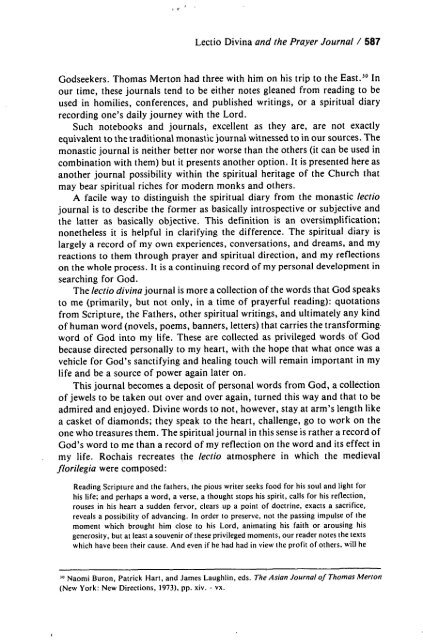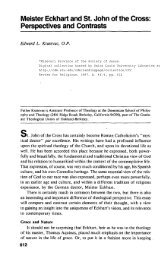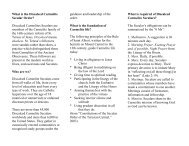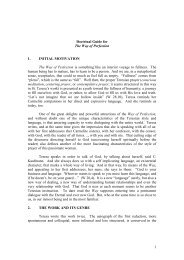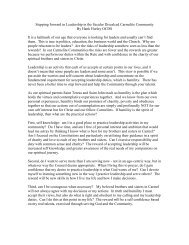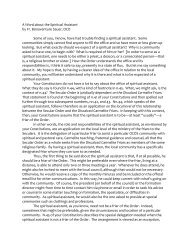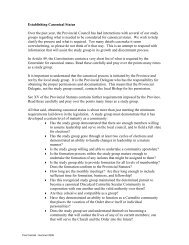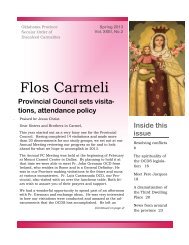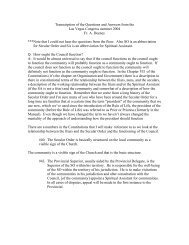Lectio Divina and the Prayer Journal - Secular Carmelites of the ...
Lectio Divina and the Prayer Journal - Secular Carmelites of the ...
Lectio Divina and the Prayer Journal - Secular Carmelites of the ...
Create successful ePaper yourself
Turn your PDF publications into a flip-book with our unique Google optimized e-Paper software.
<strong>Lectio</strong> <strong>Divina</strong> <strong>and</strong> <strong>the</strong> <strong>Prayer</strong> <strong>Journal</strong> / 5117Godseekers. Thomas Merton had three with him on his trip to <strong>the</strong> East. s° Inour time, <strong>the</strong>se journals tend to be ei<strong>the</strong>r notes gleaned from reading to beused in homilies, conferences, <strong>and</strong> published writings, or a spiritual diaryrecording one’s daily journey with <strong>the</strong> Lord.Such notebooks <strong>and</strong> journals, excellent as <strong>the</strong>y are, are not exactlyequivalent to <strong>the</strong> traditional monastic journal witnessed to in our sources. Themonastic journal is nei<strong>the</strong>r better nor worse than <strong>the</strong> o<strong>the</strong>rs (it can be used incombination with <strong>the</strong>m) but it presents ano<strong>the</strong>r option. It is presented here asano<strong>the</strong>r journal possibility within <strong>the</strong> spiritual heritage <strong>of</strong> <strong>the</strong> Church thatmay bear spiritual riches for modern monks <strong>and</strong> o<strong>the</strong>rs.A facile way to distinguish <strong>the</strong> spiritual diary from <strong>the</strong> monastic lectiojournal is to describe <strong>the</strong> former as basically introspective or subjective <strong>and</strong><strong>the</strong> latter as basically objective. This definition is an oversimplification;none<strong>the</strong>less it is helpful in clarifying <strong>the</strong> difference. The spiritual diary islargely a record <strong>of</strong> my own experiences, conversations, <strong>and</strong> dreams, <strong>and</strong> myreactions to <strong>the</strong>m through prayer <strong>and</strong> spiritual direction, <strong>and</strong> my reflectionson <strong>the</strong> whole process. It is a continuing record <strong>of</strong> my personal development insearching for God.The lectio divina journal is more a collection <strong>of</strong> <strong>the</strong> words that God speaksto me (primarily, but not only, in a time <strong>of</strong> prayerful reading): quotationsfrom Scripture, <strong>the</strong> Fa<strong>the</strong>rs, o<strong>the</strong>r spiritual writings, <strong>and</strong> ultimately any kind<strong>of</strong> human word (novels, poems, banners, letters) that carries <strong>the</strong> transformingword<strong>of</strong> God into my life. These are collected as privileged words <strong>of</strong> Godbecause directed personally to my heart, with <strong>the</strong> hope that what once was avehicle for God’s sanctifying <strong>and</strong> healing touch will remain important in mylife <strong>and</strong> be a source <strong>of</strong> power again later on.This journal becomes a deposit <strong>of</strong> personal words from God, a collection<strong>of</strong> jewels to be taken out over <strong>and</strong> over again, turned this way <strong>and</strong> that to beadmired <strong>and</strong> enjoyed. Divine words to not, however, stay at arm’s length likea casket <strong>of</strong> diamonds; <strong>the</strong>y speak to <strong>the</strong> heart, challenge, go to work on <strong>the</strong>one who treasures <strong>the</strong>m. The spiritual journal in this sense is ra<strong>the</strong>r a record <strong>of</strong>God’s word to me than a record <strong>of</strong> my reflection on <strong>the</strong> word <strong>and</strong> its effect inmy life. Rochais recreates <strong>the</strong> lectio atmosphere in which <strong>the</strong> medievalflorilegia were composed:Reading Scripture <strong>and</strong> <strong>the</strong> fa<strong>the</strong>rs, <strong>the</strong> pious writer seeks food for his soul <strong>and</strong> light forhis life; <strong>and</strong> perhaps a word, a verse, a thought stops his spirit, calls for his reflection,rouses in his heart a sudden fervor, clears up a point <strong>of</strong> doctrine, exacts a sacrifice,reveals a possibility <strong>of</strong> advancing, in order to preserve, not <strong>the</strong> passing impulse <strong>of</strong> <strong>the</strong>moment which brought him close to his Lord, animating his faith or arousing hisgenerosity, but at least a souvenir <strong>of</strong> <strong>the</strong>se privileged moments, our reader notes <strong>the</strong> textswhich have been <strong>the</strong>ir cause. And even if he had had in view <strong>the</strong> pr<strong>of</strong>it <strong>of</strong> o<strong>the</strong>rs, will he~o Naomi Buron, Patrick Hart, <strong>and</strong> James Laughlin, eds. The Asian <strong>Journal</strong> <strong>of</strong> Thomas Merton(New York: New Directions, 1973), pp. xiv. - vx.


